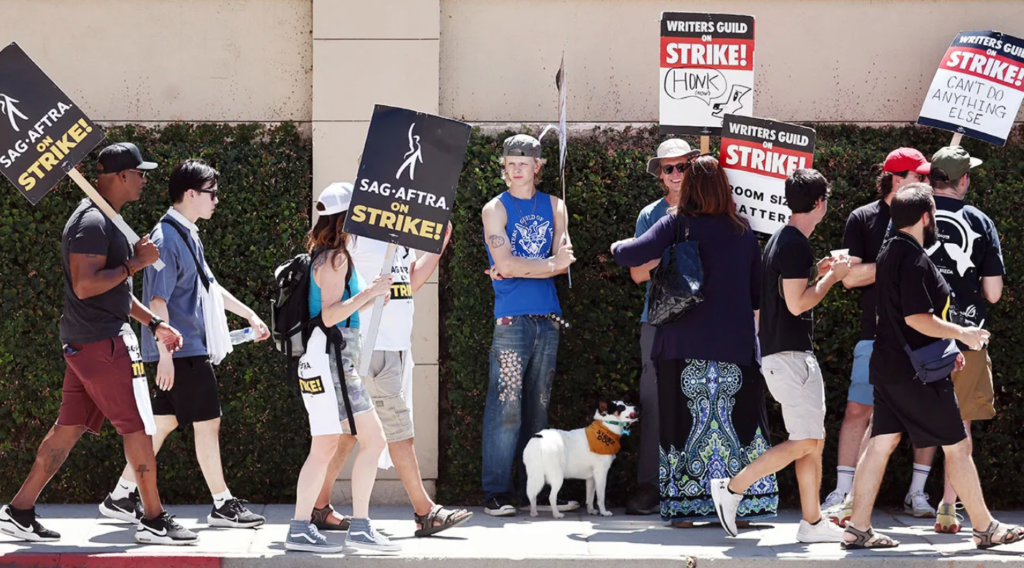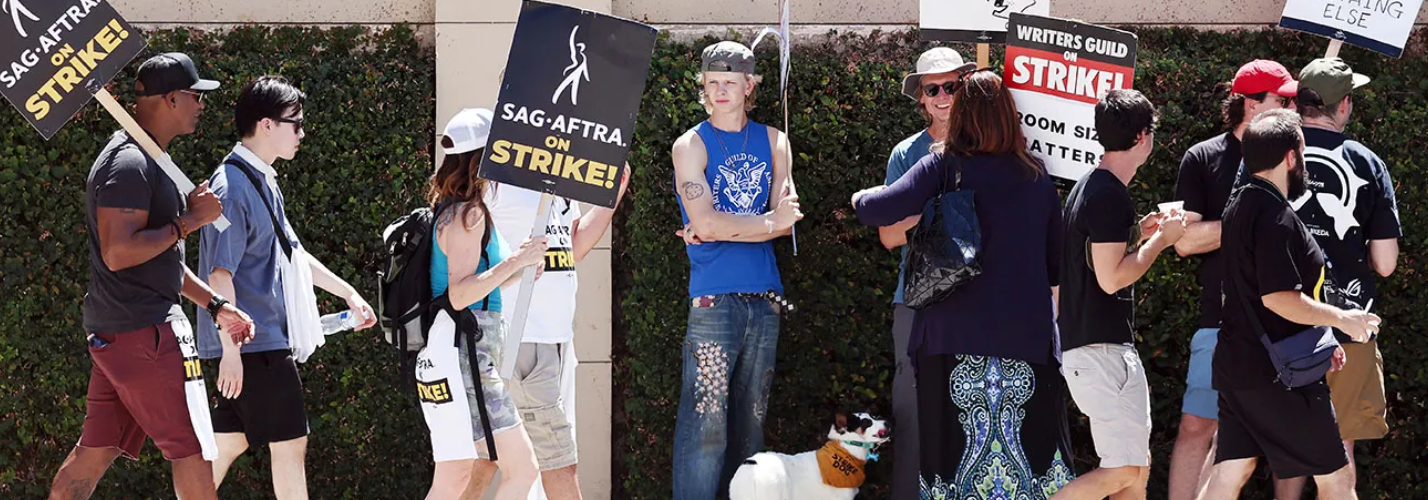
If you are an active consumer of all things television and film, you might have noticed little talk on your timeline regarding new content. Earlier this summer, the Writers Guild of America (WGA) and Screen Actors Guild (SAG-AFTRA) went on strike against the Alliance of Motion Pictures and Television Producers (AMPTP), bringing the industry to a standstill and resulting in delays and cancellations of future movies and TV shows.
The Writers Guild of America, which represents writers in film, television and new media industries, began to strike after failing to reach a new three-year deal with producing entity AMPTP–a representative of Hollywood studios and production companies, including “Studio 8,” which includes Disney, Universal Studios, Warner Brothers, Sony Pictures, Paramount, Apple, Amazon and Netflix.
This summer’s strike marks the union’s first strike in 15 years and the first actor’s strike since 1980. The coinciding strikes is recognized as the first dual Hollywood labor dispute since the 1960s.
Henry Kramer, union narrator, actor, and local strike captain for the Washington mid-Atlantic region, said what frustrates him is the lack of communication from the AMPTP and everyone it represents during negotiations.
“The fact that any of our previous negotiations were met with straight refusal and not even an attempt to negotiate in good faith makes my blood boil,” Kramer said, while attending a grassroots comedy show featuring comedians from the mid-Atlantic region.
“They wasted our time, and our time is precious because we bring story and fantasy to life, and we could be doing that instead of spending weeks in boardrooms wasting our time,” he added.
The comedy show, which took place at Busboy and Poets restaurant on Monroe Street, was put on by Grassroots Comedy DC, with proceedings going to those losing work because of the strike. The total work stoppage impacts the 160,000 actors in the Screen Actors Guild and 11,500 writers in the Writers Guild.
The WGA is currently advocating for higher minimum compensation across all media; increased residuals; fair compensation for TV series writing throughout production stages; and overall improved protections and standards for writers. The Screen Actors Guild (SAG) shares similar demands, including increased pay raises, protection from artificial intelligence, and success transparency. Both groups are also seeking increased residuals due to the influence of streaming on actors’ income.
Technology develops every day, and with that, artificial intelligence. Both guilds demand limitations on the use of AI. For those in the actors’ union, AI is often used in productions to recreate and/or clone actors. The actors’ guild expresses their likeness may be exploited and jobs devalued if limitations aren’t placed on the developing practice. In regards to writers, it means limits on the use of AI generated scripts, which caused concern for originality and – ultimately – jobs.
For the past decade, the business model in the entertainment industry has changed. With the streaming model started by Netflix, this streaming-first approach has made companies richer, but with no benefit to the people who work on the projects, such as the writers and actors.
Instead of having a fixed broadcast schedule where you have to watch on TV, viewers can now stream anything they want whenever they want from their devices, leading to the decline of cable use. With cable being on the decline, those companies were ultimately compelled to adapt to the changing climate. Now, you can watch your favorite MTV, ABC and TLC shows all from streaming apps. Don’t forget about straight-to-stream movies, which became a go-to for studios during the pandemic and never returned as the world recovered.
In the past, TV shows had longer seasons with more episodes, meaning there were greater opportunities for actors to get paid. These productions included 24 episodes per season, with new seasons airing yearly, guaranteeing work and residual pay for actors, writers and crew. Shows were also put into syndication, which equals reruns, which equals more revenue and money for the people involved.
However, most recently, there’s been a shift to shorter seasons on streaming platforms. Today, new content comes out with a short season of six episodes, and you would barely encounter a show with more than 12 episodes per season. Many of these shows get canceled if they do not garner enough of an audience to an undisclosed standard. Currently, the AMPTP does not let creatives learn the success metrics of their shows, which is why both guilds are asking for full transparency and success-based residuals.
New age streaming shows not only have shorter seasons but a longer wait time to air. The first season of the HBO series “Euphoria” premiered in 2019, and the third is expected to come out in 2025. So, if you’ve ever been upset about your favorite Netflix show having only eight episodes, more often than not, you aren’t alone.
“It has clearly segmented audiences further. There is stuff out now that people are obsessed with that I’ve never heard of, and vice versa. Back then, even if you never watched a show, you knew what it was. So now, creatives have more opportunities and space to play, but it is much harder to get noticed,” said Reese Waters, American comedian, commentator, and member of SAG-AFTRA.
Writers and actors have both been suffering under the new industry change. With seasons getting shorter and the creation of “mini-rooms,” writers are being hired for less time and getting less experience; whereas actors are no longer getting the consistent work and pay as they once did in the early to mid-2000s.
This year’s upcoming fall TV schedule looks to be heavily based on competition and reality TV content; and in a disappointment to many, several blockbuster fall premieres, such as “Dune” and “Challengers,” have been delayed until 2024.
“It’s never good when things are getting delayed and canceled. People are really struggling, and I wish that it didn’t go on as long as it has and impacted people as it has,” Waters said.
While the strikers themselves have faced job losses and the risk of losing their health insurance, the effects of the strikes are not confined to just actors and writers. The pause of the industry has implications that affect anyone involved with the development of movies and television, including those who do hair, stage lighting, costume designing and more.
“If this continues going into the fall, there will be talk. Both sides have to hurt for people to come to a resolution, and right now, it seems like mostly the labor side is being hurt,” Waters said.
The negotiations between the AMPTP and WGA are currently at a standstill, as the last time both negotiating parties met, the WGA negotiating committee did not accept the new terms offered by the AMPTP. The AMPTP later released a press release, making their offer available to all members of WGA and the public. SAG and AMPTP have not started negotiations since the actors’ strike began.










Recent Comments